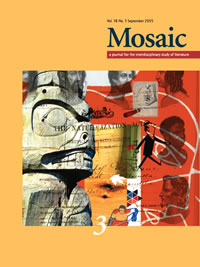Issue 38.3
Overview

General Issue
Published: September 2005
View the issue introduction or see the issue summary and contents below.
10 essays, totalling 192 pages
$16.95 CAD
Opening with two essays on cultural citizenship, and featuring additional essays on the colonial city, idolatry, ecology, gatronomy, masochism and trauma, this is a diverse general issue that is yet focused in its interrogating of narratives and histories of dominance. Look for, among other titles, Roy Miki’s “’Inside the Black Egg’: Cultural Practice, Citizenship, and Belonging in a Globalizing Canadian Nation,” Janet Mason Ellerby’s “Untangling the Trauma Knot: Autoethnography and Annie Ernaux’s Shame,” Barbara Romanik’s “Transforming the Colonial City: Science and the Practice of Dwelling in The Calcutta Chromosome,” and Umberto Rossi’s, “The Alcoholics of War: Experiencing Chemical and Ideological Drunkenness in Emilio Lussu’s Un anno sull’altipiano.”
“Inside the Black Egg”: Cultural Practice, Citizenship, and Belonging in a Globalizing Canadian NationRoy Miki In Canadian contexts, the confusion between “culture” as an achieved state and the “cultural” as practiced by embodied citizens has obfuscated the politics of cultural representation in the historical construction of national identity. Winston C. Kam’s “Inside the Black Egg” is read as a social parable that exposes the critical issues implicated in rethinking questions of citizenship and belonging. | |
Cultural Citizenship and Writing Post-Colonial Vancouver: Daphne Marlatt’s Ana Historic and Wayde Compton’s BluesprintGlen Lowry As acts of cultural citizenship, Daphne Marlatt’s novel Ana Historic and Wayde Compton’s Bluesprint: An Anthology of Black British Columbian Literature and Orature intervene in Canada’s colonial history from different West Coast cultural locations. These two texts foreground the contradictory function of “race” in the rewriting of post-nationalist histories and literature. | |
Transforming the Colonial City: Science and the Practice of Dwelling in The Calcutta ChromosomeBarbara Romanik Within the imperialistic frameworks of colonial science and architecture, this essay examines Amitav Ghosh’s portrayal of colonized and colonizer, Indian and British, powerless and powerful in The Calcutta Chromosome. Ghosh’s characters, in their everyday practices of walking and dwelling, reassert, challenge, and transform the existing power structure of the city of Calcutta. | |
Untangling the Trauma Knot: Autoethnography and Annie Ernaux’s ShameJanet Mason Ellerby Distinguishing between three approaches to trauma recovery—repression, scriptotherapy, and autoethnography—this essay interrogates the trend to promote repression as a means of coping. Instead, it offers autoethnography, specifically Annie Ernaux’s Shame, as an effective method for reconfiguring the cultural and psychological convergences that surround trauma and for attenuating repetition. | |
The Alcoholics of War: Experiencing Chemical and Ideological Drunkenness in Emilio Lussu’s Un anno sull’altipianoUmberto Rossi This article applies the reflections on experience and narrative found in Walter Benjamin’s “The Storyteller” to a popular Italian World War I novel, Emilio Lussu’s Un anno sull’altipiano. The essay focuses on alcohol abuse repeatedly depicted in the novel as a component that can lead to a dissolution of traditional narrative forms. | |
A Taste for Words: Gastronomy and the Writing of Loss in Brillat-Savarin’s Physiologie du goûtLuke Bouvier Gastronomic writing emerged in nineteenth-century France as a discourse aspiring to scientific rigour but also giving voice to a pervasive sense of loss and nostalgia. Through a reading of Brillat-Savarin’s seminal gastronomic work, Physiologie du goût, this essay seeks to account for this persistent tension in gastronomic writing through a consideration of the problems of taste, language, and oral desire. | |
Iconoclastic Commitments: Idolatry and Imagination in Cynthia Ozick and Ronald SukenickAdam Katz This essay explores the enactment of the Judaic polemic against idolatry for two important contemporary novelists: Cynthia Ozick and Ronald Sukenick. It articulates the polemic that these novels have retrieved in very different ways, and addresses some implications of taking Ozick and Sukenick literally. | |
Ecology, Egyptology, and Dialectics in Muriel Rukeyser’s “The Book of the Dead”Leonard M. Scigaj Studying how Muriel Rukeyser combines mythopoetics from the Egyptian Book of the Dead with Marxist dialectics reveals how, in the final section of her long poem “The Book of the Dead,” she transforms a historical narrative of a Union Carbide worker tragedy into an ecological version that critiques corporate greed and America’s manifest destiny myth. | |
Bluebeard’s Accomplice: Rebecca as a Masochistic FantasyHeta Pyrhönen This essay interprets Daphne du Maurier’s _Rebecca_ as an instance of Bluebeard Gothic, arguing that it turns the typical Gothic relations of dominance upside down: the romantic heros turns out to be a masochist, while his wife is alloted the role of the beating woman. The essay also examines the novel’s “masochistic art of narration.” | |
American Frankenstein: Modernity’s Monstrous ProgenyRuddell J. A. Kilbourn Milton’s Eve in Paradise Lost and Shelly’s monster in Frankenstein provide the comparative intertext for a constructivist analysis of a key scene in Mary Harron’s film adaption of Bret Easton Ellis’s novel American Psycho, in which Patrick Bateman emerges as an avatar of the “monstrous” postmodern masculine subject. |